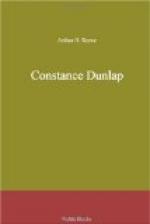There was a sudden tap at the door.
“Quick—in there,” whispered Constance, shoving her through the portieres into the drawing room.
It was Forest Caswell.
For a moment Constance stood irresolute, wondering just how to meet him, then she said, “Good evening, Mr. Caswell. I hope you will pardon me for asking you to call on me, but, as you know, I’ve come to know your wife—perhaps better than you do.”
“Not better,” he corrected, seeming to see that it was directness that she was aiming at. “It is bad enough to get mixed up badly in Wall Street, but what would you yourself say—you are a business woman—what would you say about getting into the clutches of a—a dream doctor—and worse?”
He had put Constance on the defensive in a sentence.
“Don’t you ever dream?” she asked quietly.
He looked at her a moment as if doubting even her mentality.
“Lord,” he exclaimed in disgust, “you, too, defend it?”
“But, don’t you dream?” she persisted.
“Why, of course I dream,” he answered somewhat petulantly. “What of it? I don’t guide my actions by it.”
“Do you ever dream of Mildred?” she asked.
“Sometimes,” he admitted reluctantly.
“Ever of other—er—people?” she pursued.
“Yes,” he replied, “sometimes of other people. But what has that to do with it? I cannot help my dreams. My conduct I can help and I do help.”
Constance had not expected him to be frank to the extent of taking her into his confidence. Still, she felt that he had told her just enough. She discerned a vague sense of jealousy in his tone which told her more than words that whatever he might have said or done to Mildred he resented, unconsciously, the manner in which she had striven to gain sympathy outside.
“Fortunately he knows nothing of the new theories,” she said to herself.
“Mrs. Dunlap,” he resumed, “since you have been frank with me, I must be equally frank with you. I think you are far too sensible a woman not to understand in just what a peculiar position my wife has placed me.”
He had taken out of his pocket a few sheets of closely typewritten tissue paper. He did not look at them. Evidently he knew the contents by heart. Constance did not need to be told that this was a sheaf of the daily reports of the agency for which Drummond worked.
He paused. She had been watching him searchingly. She was determined not to let him justify himself first.
“Mr. Caswell,” she persisted in a low, earnest tone, “don’t be so sure that there is nothing in this dream, business. Before you read me those reports from Mr. Drummond, let me finish.”
Forest Caswell almost dropped them in surprise.
“Dreams,” she continued, seeing her advantage, “are wishes, either suppressed or expressed. Sometimes the dream is frank and shows an expressed wish. Other times it shows a suppressed wish, or a wish which in its fulfilment in the dream is disguised or distorted.




